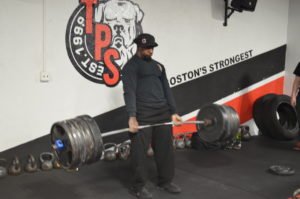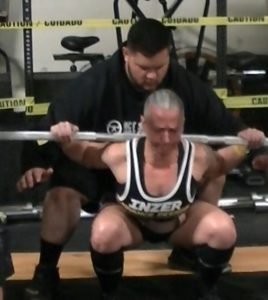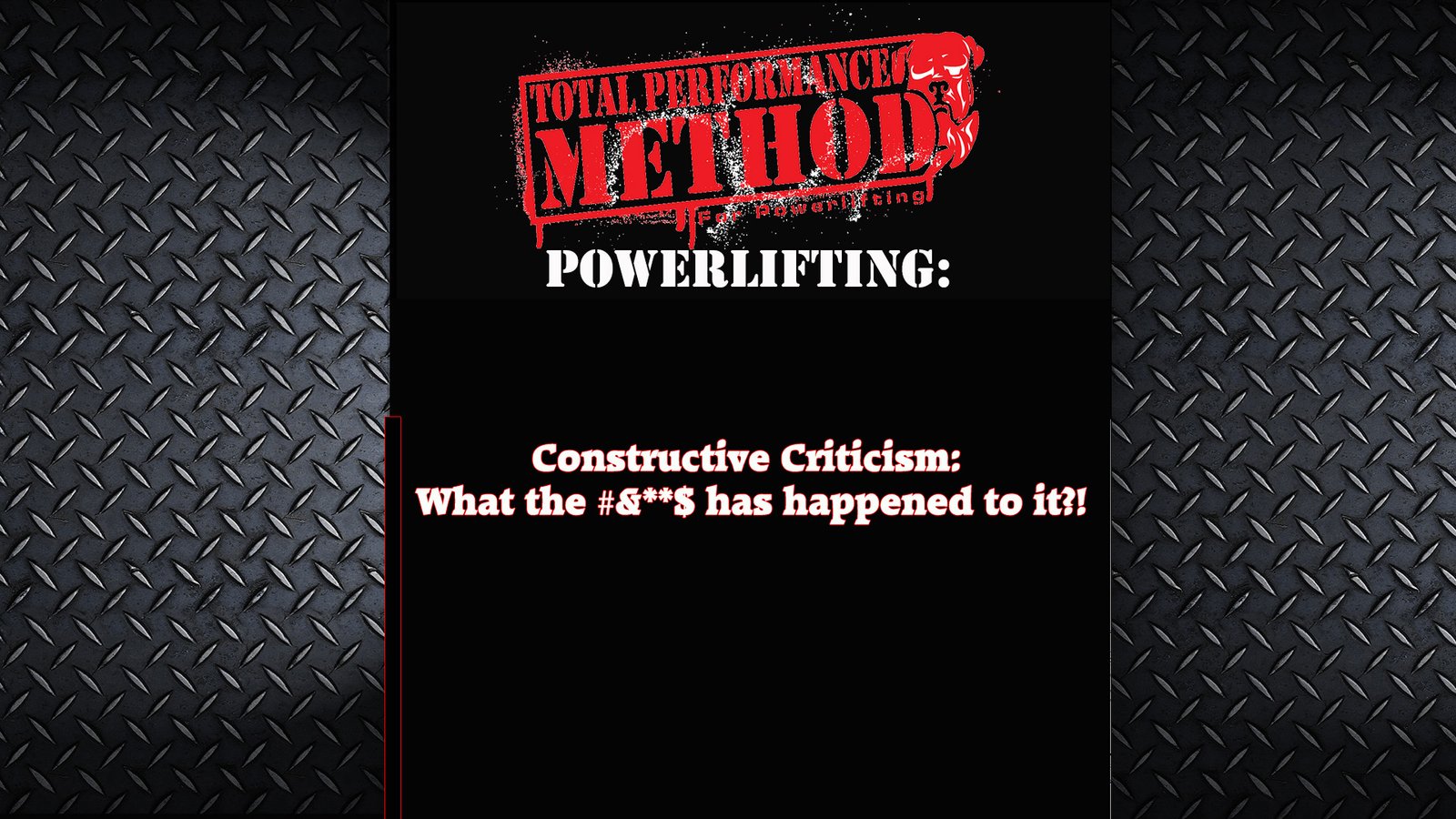Powerlifting is a delicate but violent coordination of mental aptitude, nervous system impulses, and musculature contraction. Within this strange world, two general training approaches exist: powerlifting squads and training alone. This article will focus on several benefits and pitfalls of the latter and not the former.
FULL DISCLAIMER:
My perspective is skewed in this matter.
I purposefully train alone and have been doing so the last four years.
I have my own reasons and I will keep them to myself.
I am not here to convince my approach is better but I would be lying if I said my perspective would be impartial in writing this article.
In addition, my writing style is chaotic.
Do not expect the obvious flow.
With that said, buckle up chucklenuts.
Benefit #1/ Pitfall #1 of Training Alone
Going at your own pace.

This can be refreshingly beneficial when it works and a disastrous pitfall when it fails. Training sessions driven by a singular individual can facilitate a process of self-regulation. A process that can allow a person to be more deliberate and intentional in what they are doing whether it is a deadlift or an accessory motion (a rare skill to develop by the way). Secondly, being on your own (forgoing spotters) can help one’s composure; thinking while straining and being able to relatively survive a brutal grind alone. In the end, it is just you when you step on that platform. Thirdly, there is no concern in what other people are doing. It is just you. The pitfall occurs when that same individual is atrocious at time-management. It if takes an individual 2 hours to do 30 minutes of actual work then that person is horribly inefficient. This is where a pack can come in handy. Having multiple people telling you to get your shit together is quite “inspirational” (personally, you should be able to do this yourself). But that is for another time.
Benefit #2 of Training Alone
Self-efficiency
This one is fucking significant and can be a byproduct of the first benefit. It boils down to the manner of which time is being used. In other words, how do you use time? Does it take you 2-3 hours to complete an hour of work? Do you take 60+ minutes to perform accessory work? Again, how is one spending the time is paramount. An individual can be at the whim of the group; the various personalities & demands. In regards to training, one could be wasting time on accessory work that OTHER members of the group need but not for said individual. For me, simply too many x-factors within a squad. Training alone can minimize those wild-card factors BUT being self-efficient requires absolute (and extreme) self-accountability (another skill that is not common in today’s society). If done so, one spends the exact amount of time needed for the work.
Arrive.
Do the work.
Leave.
No distractions.
Pitfall #2 of Training Alone
Isolation/loneliness
This can be straight-up deplorable. In our society, everyone seems to strive for attention (on some level or another). Everyone seeks to fit in whether it is a particular training style or a more general ideology. When it comes to training alone, one meets this head-on. Unfortunately, outcomes such as lethargic outlook, complete program drop-off, and borderline depressive tendencies can occur. This is clearly evident on heavy/max out days. A missed attempt is the worst. Alone from a group, the feeling of isolation/loneliness will occur. And this shit spread. Solo training sessions are not the only place to observe this but deadlifting multiple magnitudes of bodyweight can be insurmountable whilst in this shithole of the pitfall.
Yet, there is definitely something to earn/develop that needs a bit of isolation and that is…
Benefit #3 of Training Alone
Discipline
I do not think there is a better way to understanding and growing discipline outside of being on your own. Cut it how you may but there is no way of getting around or avoiding poor discipline. Surely, a group of individuals can assist and support the development of discipline but that should be superseded by the individual’s willingness to do so on their own. Focus, self-efficiency, and intentional consistency initiated within the individual with always funnel into the maturation of one’s discipline. An individual’s dependency on the squad should be staunchly minimized because it invites the pitfall of failing when not accompanied by the group. And this is not limited to powerlifting or any related physical training. Discipline is paramount in all facets of life, both major and minor aspects. The kicker about discipline and developing it is that it can be done with little to no talking, zero care for cliché and overtly corny motivation snidbits, AND without the need to broadcast it on some bullshit social media platform. I fucking dare you to do this part. Yet, discipline is not invulnerable from the last pitfall.
Pitfall #3 of Training Alone
Self-destruction
Whether it is outside factors, technical failure, poor outlook, or combination of all at once, implosion is not pretty. The potency of this pitfall is dramatically augmented when training alone. There is no group; no safety net; no buffer between one and self-destruction. It is more than simply digging one’s own grave but crashing down like a fucking meteor. Sometimes it is obvious with individuals and sometimes it is subtler such as in a change of body posture and what non-verbal language is given off. As beneficial as one’s focus can be it can also be detrimental because that focus can be turned inward; highly concentrated & and highly debilitating. At that stage, it becomes a game of damage control. One’s own maniacal focus and singular drive can be also one’s direct downfall.
Summing up the The Benefits and Pitfalls of Training Alone
In the end, I do not recommend this path for anyone. It is more of a forced circumstance rather than a conscious decision to train. Yet, with time this training ideology can become normal and just as fruitful as with training with a squad. Furthermore, this article BARELY touches on the individual perspective in actively training alone. I could write a small book on powerlifting and the perspective of one training and learning on their own (stay tuned?). Curiously enough, the benefits and pitfalls one suffers on their own can be connected to each. At times, one may need to suffer self-destruction to further one’s grasp on what it means to be disciplined. Recognizing one’s overt waste of time can lead to efficiency.
One thing that reigns true is an individual that is efficient, focused, and disciplined will always strengthen the group.
by
John Romanowski
TPSMethod Coach

Editors Note:
John is a former in house TPS Method coach who is now working for us remotely from the backwoods somewhere.
He is a competitive powerlifter with best lifts of:
1224 total at 82.5 kg.
430 squat
254 bench
540 deadlift
He’s also wicked smart with an in M.S biology
Concentration: Microbiology, cellular and molecular biology, phylogenetics.
Try the TPSMethod.com for free.
No Risk!









Enjoyed the article, especially how it read! Felt like I was having a conversation with a wicked Smaht dude!
Thanks.
I just let the author know.
Thank you for sharing this article on the benefits and pitfalls of training alone in powerlifting. As someone who is interested in powerlifting, it’s great to see a perspective on this particular training approach.
I appreciate your transparency and honesty about your own bias towards training alone. It’s refreshing to see that you acknowledge your personal preference while still aiming to provide valuable insights for readers. I’m curious to know more about the specific reasons why you choose to train alone. Although you mentioned keeping those reasons to yourself, it would be interesting to understand how your experience has influenced your perspective on the benefits of solo training.
The first benefit you mentioned, going at your own pace, resonates with me. Having the freedom to structure your training sessions according to your own needs and goals can be empowering. However, I can also see how time-management could become a pitfall for some individuals. It would be helpful to explore strategies or techniques that can help individuals who struggle with efficiency in their solo training. Are there any tips or suggestions you can provide to overcome this challenge and make the most of training alone?
Additionally, I’m curious about the potential mental and emotional aspects of training alone. While having a support system or training partners can provide motivation, how do you personally handle the mental challenges that come with training alone? Do you have any strategies for maintaining focus and pushing through difficult workouts when there is no external accountability or encouragement?
Overall, I want to express my gratitude for sharing your insights on training alone in powerlifting. Your unique perspective and willingness to address both the benefits and pitfalls make this article engaging and thought-provoking. Thank you for taking the time to explore this topic and share your experiences with us.